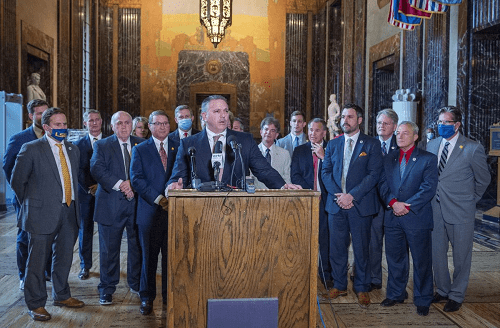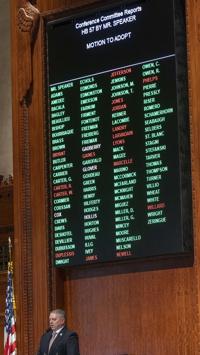
12.31.20 – The Advocate
Starting Friday, acupuncture and most cancer treatments will be covered. Jurors will be paid more.
But the biggest of the new laws that go into effect on Jan. 1 are the smash of acts aimed, supporters say, at lower automobile insurance rates. They range from limiting access to the courts for individuals claiming injuries to requiring lawyers who advertise to disclose their fees.
The first day of the New Year is traditionally when many of the laws passed during the previous legislative session go into effect. After three legislative sessions, 468 bills made it through both chambers and were signed by the governor into law. Most became law immediately upon the governor’s signature, rather than the New Year.
Of the 25 new laws Friday, one extends the carryforward period for business inventory taxes from five years to 10. Another allows the research and development tax credit to stay on the books for four more years at a cost of about $6 million.
A third eases the ability of family members to receive the required licensing to continue their occupations when their military spouse is transferred to Louisiana. Another new law changes the rules to allow auction houses with licensed auctioneers to conduct live auctions on the internet, except for livestock.
Act 152, by state Rep. Chad Brown, D-Plaquemine
Would require state insurance cover acupuncture treatments for about 218,000 current and former state employees.
Act 161, by Oil City Republican Rep. Danny McCormick
Frees candidates from having to record social security numbers of contributors giving less than $25.
Act 222, by state Sen. Kirk Talbot, R-River Ridge
Will require all health plans to cover medically necessary drugs prescribed for cancer patients.
Act 237, by Sen. Cleo Fields, a Baton Rouge Democrat (brother is a judge)
Increases juror compensation from $25 to $50 for each day of attendance and the mileage rate from 16 cents to what state officials get paid, which currently is 58-cents per mile. The increase won’t impact taxpayers or the courts as those expenses are part of the fees charged the party seeking a civil jury trial.
Act 223, by Sen. Troy Carter, D-New Orleans
Now requires that drivers’ education courses discuss handicapped accessible parking spaces and tests that knowledge of drivers in tests for licenses. Carter said the effort mostly is to sensitize drivers to the issues of the handicapped and preclude more mobile drivers from grabbing the light blue painted spaces or infringing on handicapped parking.
“When you obstruct those blue lines,” Carter told his colleagues, “and the handicapped have to get a wheelchair out or lower a lift, they can’t do it … Something that becomes very simple for all of us becomes a nightmare for handicapped.”
The most sweeping law, called the Civil Justice Reform Act of 2020, changes how courts will operate when considering injuries caused in car crashes.
Act 37
Has been long sought by business and insurance communities that claim Louisiana’s civil justice system promoted the lawsuits that helped drive up insurance rates to some of the highest in the nation. But judges, lawyers and medical providers countered that significant harm to civil jurisprudence would be caused by the changes wanted, including stressing the resources of the courts, limiting injured individuals’ recoveries, and upsetting traditional procedures — all without any guarantee that insurance rates would fall.
The new law, among other things, lowers the “jury threshold” — the amount sought that triggers having a jury decide rather than a judge — from $50,000 for a case to $10,000; sets rules and procedures for demanding a jury trial, including requiring a cash bond for the party requesting one; forbids the mentioning of the defendant driver’s insurance company and policy except at the beginning and end of the trial.
“The Civil Justice Reform Act of 2020 will create a major change in how the public and business leaders across the country perceive Louisiana’s business climate and should help reduce the cost of insurance,” House Speaker Clay Schexnayder, Gonzales Republican and chief sponsor said then the legislation was signed.
In addition, Act 36 by Slidell Republican Sen. Sharon Hewitt allows failure to wear a seatbelt in a motor vehicle to be used in evidence, thereby limiting the damages paid to an injured person who didn’t cause the accident that hurt them.
Act 231, by Sen. Patrick Connick, R-Marrero
Will require lawyer advertising that includes boasts from clients about how much they received from car wreck litigation to also include how much was paid in attorney fees.
Bob Kleinpeter, of Baton Rouge and the lawyer injured people on the task force that came up with the initial “tort reform” legislation, said much of the conversation during those meetings was complaints about lawyer advertising. The theory, though unproven with data, is that the ads promoted lawsuits. Smiling clients were portrayed with big smiles bragging about hundreds of thousands of dollars the attorney won for them, making car wrecks sound like winning the lottery.
“People are frustrated with advertising and want to assign a causal reason for driving up the number of claims. There’s no information that advertising lures cases,” Kleinpeter said. “It’s a national phenomenon.”
The bigger issue down the road is whether the Legislature can pass laws governing attorneys, whose standards are set and regulated by a different branch of government, the Louisiana Supreme Court via the State Bar Association.
Connick recognized the problems when pushing his bill.
“The statute applies to attorneys, true. We’re hoping that the Supreme Court brings this (new law) this under their umbrella,” Connick told his colleagues.

